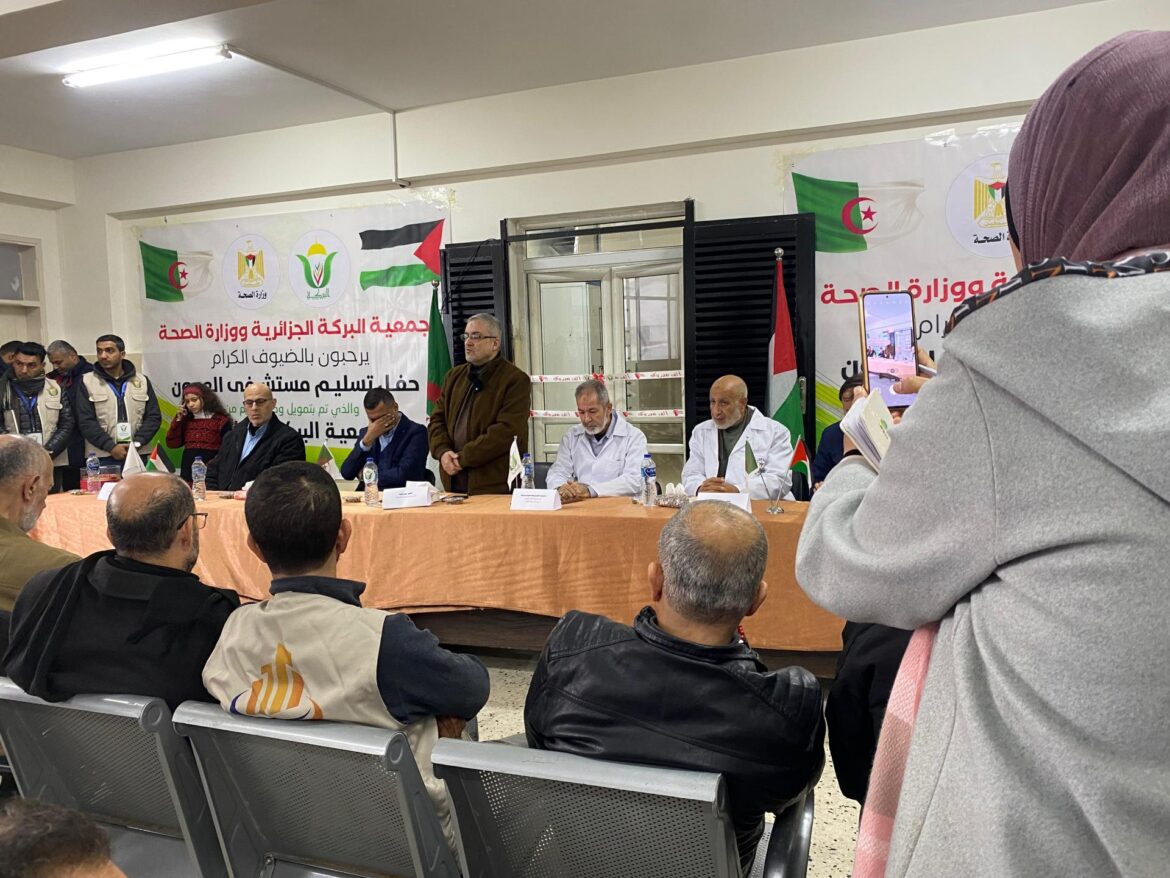Tel Aviv Tribune Net correspondents
Gaza- In an additional stance that expresses the will to persevere, Gaza doctors were able to restore the eye hospital and return it to service after Israel began targeting hospitals in the Strip. It was the first hospital to be burned and destroyed in early November, 14 months ago.
The Ministry of Health in Gaza summarizes the story of the hospital to the attendees who came to witness its opening after restoration, saying, “The engineering crews told us that it is impossible to reconstruct the eye hospital in these circumstances.” The Undersecretary is silent for a moment before continuing with a triumphant smile, “But the impossible today has become a reality.” He applauds. For him, those gathered for a long time, it is an act that everyone here sees as a victory that defeated the will of Israel.
A will that defies destruction
The Undersecretary of the Ministry of Health, Maher Shamiya, continues his speech during the event, which he considers exceptional, and says, “Nothing breaks the will of us, the people of white uniform, who chose to remain in the field despite all the extermination attempts to which we were subjected,” expressing his ministry’s pride in its ability to restore life to this medical edifice. “Who was forcibly removed from service.”
Shamiya explained during a speech he delivered during the opening that restarting the hospital aims to provide specialized and comprehensive medical services for eye patients in one place, after these services were scattered between the National Hospital, the public service, and other clinics, to include the provision of emergency services, specialized clinics, and surgical operations.
While speaking about the hospitals in the northern Gaza Strip that have completely stopped working, the Undersecretary confirmed the readiness of medical teams to resume work in the North Governorate, provided that conditions are created for this, such as opening the roads leading to the hospital, providing medical personnel, oxygen, and diesel, and ensuring the safety of patients and employees, as he stressed. The urgent need to establish a field hospital to provide urgent services to thousands of people trapped in the northern Gaza Strip governorate until one of the hospitals there is rehabilitated.
Shamiya revealed his ministry’s intention to open new departments and projects and added, “We are in the process of renovating the oncology and kidney failure departments,” calling for the necessary support for the “General Service” Hospital for the intensive care departments, providing oxygen pumps for the “Friends of the Patient” Hospital, and providing periodic supplies for the “Baptist” Hospital, which He receives dozens of wounded daily, concluding his speech by saying, “We will continue to work to the best of our ability to provide services to our Palestinian people.”
As for the Director General of the Ministry of Health, Mounir Al-Bursh, during an interview with Tel Aviv Tribune Net, he sent a firm message to the Israeli occupation, saying, “Whenever Israel destroys a facility, we rebuild it. Yesterday, it took Kamal Adwan Hospital out of service, and today we restarted the Eye Hospital.”
This determination and challenge is clearly evident in the ministry’s scheduled plans, revealed by Al-Bersh, to rehabilitate all hospitals that were destroyed by the occupation. He added firmly, “This is our inherent right and our sacred duty towards our people, to continue working without stopping, and to continue until the last breath. There is no response to genocide.” Systematic reform of the health system except by insisting on rebuilding and continuing relentlessly.”

Urgent necessity
The official in charge of eye services at the Ministry of Health, Abdel Salam Sabah, confirmed that hundreds of injured people lost their sight as a result of the lack of the necessary capabilities, devices, equipment and treatments they need, which made the restoration of the hospital an urgent necessity as it is the main hospital designated to provide ophthalmology and ophthalmology services in Gaza.
Sabah said that the hospital is ready to receive large numbers of accumulated patients who have not been able to obtain eye services for more than 14 months in Gaza.
Although the war has not ended, and the danger still threatens everything that pumps life into Gaza’s artery, the doctors believe that they are performing their humanitarian duty, and that danger will not prevent them from performing this duty, while they call on international institutions to assume their responsibility and play the role assigned to them in preserving Medical personnel and hospitals must be kept from being targeted in the Gaza Strip, in line with the Fourth Geneva Convention.
The Al-Baraka Foundation of Algeria had funded the restoration project for the Eye Hospital as part of its “Promise in Action” campaign, which it launched to support and support the Gazans.



